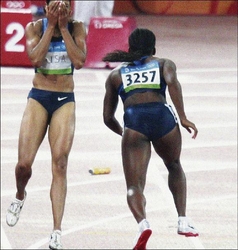Group calls for big changes at USA Track and Field
Published: Tuesday | February 10, 2009

United States' Torri Edwards (left) and Lauryn Williams react after dropping the baton in the women's 4x100-metre relay at the Beijing 2008 Olympics. - file
COLORADO SPRINGS, Colorado (AP):
In a stinging indictment of what went wrong with the American athletics teams at the Beijing Olympics, a task force lashed out at the relay system, recommended streamlining Olympic trials and called for a more stringent policy for drug cheats who want to be reinstated.
The 69-page report released yesterday was commissioned by USA Track and Field's (USATF) new CEO, Doug Logan.
Americans led all countries with 23 athletics medals in Beijing but failed to live up to expectations in many areas. Their seven gold medals were the lowest haul since the 1997 World Championships. The task force is called 'Project 30', a reference to the goal of winning 30 medals at the 2012 London Olympics.
Lack of professionalism
The nine-person panel, which included sprint great Carl Lewis, decried an overall "lack of accountability, professionalism and cohesion" among staff, coaches and athletes. The group suggested athletes focus more on winning Olympic medals, less on things such as appearance fees and access to TVs in the Olympic village.
To spearhead all the changes, the task force called for the hiring of a general manager to oversee all aspects of USATF, which has long been criticised as being too political and balkanised.
Though not specifically asked to cover the doping issue, the task force said, "This is the single most important issue to the long-term success of track and field, domestically and internationally."
It called for current anti-doping standards to be augmented by the USATF, saying cheaters should be reinstated only if they provide depositions under oath "detailing what went into their decision to cheat, how they obtained and used their drugs, and who contributed to their cheating". It also called for dopers who want to return to enter a "rehab" programme so they can learn how to compete cleanly after their suspensions.
A moral obligation
The task force conceded the system they recommend likely would be challenged in the courts, but believes the USATF "has a moral obligation to make the effort".
"Any legal costs will be more than repaid by the culture shift it will help establish," the report read.
The most scathing criticism was levelled at the American relay effort.
The men's and women's 400-metre teams each dropped the baton in qualifying - a debacle that punctuated the underachieving effort of the entire team.
The panel called for the American Relay Programme - which spent more than US$1 million and trained 173 athletes from 2003-08 - to be disbanded immediately, saying the concept was good but the execution wasn't.
The panel described a general atmosphere of confusion, politicking and anxiety that ultimately led to bad exchanges between Darvis Patton and Tyson Gay in the men's race and Torri Edwards and Lauryn Williams in the women's.
"The task force was troubled by the fact that the athletes themselves seemed to have no idea why the stick dropped, beyond saying it was "one of those things' and the stick had a mind of its own," the report read.
The disorganisation may have been best illustrated by the scene shortly before the women's relay when the runners were in the holding room, about to head to the starting line, with no idea where their bibs were. Their numbers had to be handwritten at the last second.
"One athlete was ... nearly crying when she spoke of how embarrassing it was to them," the report read. "That the bib debacle transpired just moments before taking the track did not help the team's fortunes, as it was clearly a very significant distraction and cause of negativity. The same issues played out in different ways" in the men's relay.
Olympic trials
The 10-day Olympic trials, which includes two rest days, might be part of the problem.
The panel did not recommend any change in the awarding of spots to the top three finishers in each event, provided they have an Olympic qualifying standard. That leaves the US team vulnerable to injuries of top athletes, such as when Gay went down during 200-metre qualifying.
But the task force said a shorter schedule and fewer entrants was a good idea, because the meet taxes athletes emotionally, physically and financially and doesn't necessarily set them up for their best performance at the Olympics.














